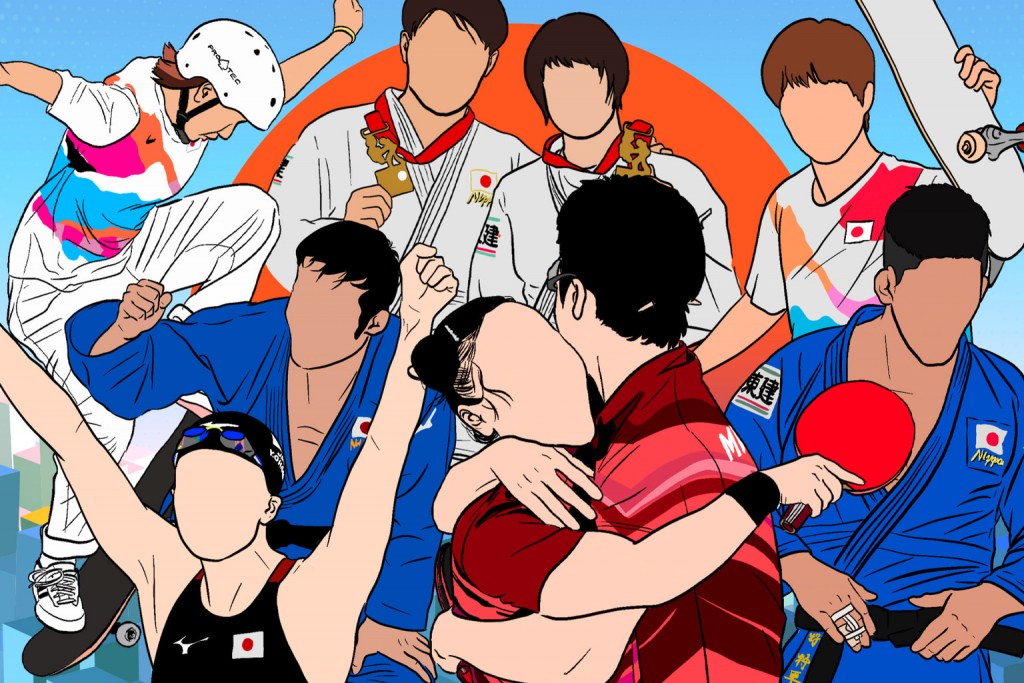Host nations always tend to do pretty well at the Olympics. Yet, even with that in mind Team Japan has, thus far exceeded expectations, leading the medal table for much of the first week. There have already been many memorable performances from the home country. In this short series, we’ll be taking a closer look at Japan’s gold medalists, beginning with those who topped the podium on the first three days.
Naohisa Takato — Men’s Judo -60kg
It was no surprise to see Japan’s first gold medal come in judo. Naohisa Takato thrilled the nation on Saturday evening with his victory over Taiwan’s Yang Yung-wei in the 60kg category. He was hoping it would be a double celebration with Funa Tonaki, but she agonizingly lost in the final by a point to Kosovo’s Distria Krasniqi. “We were planning to both win the gold medal together but I was able to do it,” said Takato through an interpreter. “The first one for the Japanese national team. I think I was lucky, but of course I’m happy that I was able to inspire the national team of Japan.”
Takato started doing judo at the age of seven. He says he felt inspired after watching the Sydney Olympics in which four of the country’s five golds came in judo. One of the biggest stars of the time was Tadahiro Nomura, the only judoka to win three consecutive Olympic gold medals. Takato followed in his footsteps, competing in the 60kg division. He won his first World Championship in 2013 and was favorite for gold at the 2016 Rio Games. A disappointing third place finish, however, spurred him on to two more world titles and his ultimate goal of an Olympic gold.
Yui Ohashi — 400m Individual Medley
In her second year of college, Yui Ohashi felt something wasn’t quite right. She was out of shape and her results in the pool were suffering as a result. She finished last at the Japan Swim and failed to qualify for the Inter College Swimming Championships. What’s more, she was regularly out of breath. Unsure as to why her times in the pool were getting slower, she decided to see if there was a medical reason for her struggles. It was then revealed that she had anemia. It’s a condition in which the body lacks enough healthy red blood cells to carry oxygen efficiently. This often leads to fatigue and a shortness of breath.
“I hit rock bottom in 2015,” said Ohashi in her profile. “I found out that I had anemia, which was the reason for my poor condition. After my health started to improve, I began to think, ‘I want to compete in the final at the final selection for the Rio 2016 Games. I also want to set my best record.’ It was the first time that I felt such a strong determination. The experience was probably the turning point of my swimming career.” She went on to claim a silver in the 200m individual medley at the 2017 World Championships and a bronze in the 400m individual medley in 2019. Now, she’ll bring back two gold medals to her hometown of Hikone in Shiga Prefecture.
Yuto Horigome — Men’s Street Skateboarding
Performing in the city where he learned to skateboard, it looked like the pressure was getting to Yuto Horigome. His initial runs were disappointing and it appeared that his medal chances were slipping away. Then, he started to show the world why he is considered such a special talent. The California-based skateboarder scored nine-plus points for each of his last four “best tricks,” including a 9.5. He received that for a nollie 270 noseslide — flipping his board after take-off then sliding down the rail on its nose. A total of 37.18 was enough to win him the first ever Olympic gold medal for skateboarding.
Horigome first took up the sport during his elementary school days. He learned from his father while also watching videos of old American skaters. He once said in class that his dream was to have his own home in the States. That became a reality last year when he purchased a four-room house in Los Angeles. He first moved to the US after high school to develop his skateboarding skills. Constantly improving, the Tokyo-native won gold at the Summer X Games in Minneapolis in 2019 and at the World Championships in Rome in 2021. His greatest achievement to date, though, came on home soil.
Uta Abe — Women’s Judo -52kg
“July 25 will be the day that my brother and I shine,” Uta Abe told the Tokyo 2020 website before the Olympics. She wasn’t wrong. The judoka siblings lit up the Budokan last weekend, becoming the first brother and sister to win gold medals in different events on the same day. It was Uta, the younger member of the family, up first. She took on France’s Amandine Buchard for gold in a final that most people expected. Into the golden score, Abe blocked Buchard’s kata-guruma (shoulder wheel). She then turned her over and pinned her down. It was the move that ultimately won the match.
Uta started going to the same judo class as her brother when she was five. As a child she would watch her older sibling’s bouts and then try to copy his moves. Stepping out of Hifumi’s shadows, Uta became the youngest ever judoka to win an International Judo Federation (IJF) Grand Prix when she triumphed in Düsseldorf at 16. A year later she won her first World Title in Baku. She defended her crown in Tokyo two years later, but her victory in Azerbaijan’s capital was more memorable. Not only because it was her first, but also because her brother became World Champion on the same day.
Hifumi Abe — Men’s Judo -66kg
And it was an even better feeling in Tokyo. Following her match with Buchard, Uta stood at the side of the mats to watch her brother’s final. After qualifying for Tokyo 2020 back in December, Hifumi immediately set his sight on making history with his younger sibling. “Now I can officially say I’m aiming for a gold medal with my sister at the Olympics. As her big brother, I can’t afford to lose,” he joked. True to his word, less than an hour after Uta’s triumph, Hifumi became Olympic champion. Taking on Georgia’s Vazha Margvelashvili in the final, an osotogari (large outer reap) throw earned him a waza-ari (the second highest score in judo). It was enough for the victory.
Hifumi’s biggest test arguably came in qualifying for the Olympics. In a one-off, winner takes all bout, he took on Joshiro Maruyama. It was the 2017 and 2018 world champion (Abe) versus the 2019 winner. All the other places on Japan’s judo team had been decided and this was being billed as the match of the century. It didn’t disappoint. A standard judo match lasts four minutes. This one ended 20 minutes into the golden score. Hifumi settled the grueling encounter with an ouchi gari (inner leg sweep) throw which earned him a waza-ari. It’s just a shame it wasn’t the Olympic final itself.
Momiji Nishiya — Women’s Street Skateboarding
Momiji Nishiya was just six when Tokyo was awarded the 2020 Olympics and had only just taken up skateboarding. Her family regularly went snowboarding and it was seen as something fun she could do in the off-season. Eight years on and she’s still having fun. The difference now is she’s an Olympic champion. Not only that, at 13 years and 330 days, she’s also the youngest Japanese person in history to win gold at the Summer Games, taking over from swimmer Kyoko Iwasaki who’d just turned 14 when she won the 200m breaststroke in Barcelona. Nishiya’s the second youngest person to top the podium at the Summer Olympics, 62 days older than American diver Marjorie Gestring was when she won gold at the 1936 Berlin Games.
Going into the final of the women’s street skateboarding competition, two-time world champion Aori Nishimura was seen as Japan’s best hope while Nishiya and fellow teen Funa Nakayama were considered dark horses. In the end, it was the younger pair rather than Nishimura challenging for the medals. With two tricks remaining, 13-year-old Brazilian Rayssa Leal looked on course to become the youngest ever Summer Olympic champion. Then Nishiya stole the lead with her penultimate trick. After Leal fell in the final round, only Nakayama could catch her teammate. She tried to go big but ended up falling and had to settle for bronze. The average age of the podium was 14.
Shohei Ono — Men’s Judo -73kg
The last time Shohei Ono lost an international judo bout, Barack Obama was president of America, Britain was still part of the EU and ‘corona’ was just a beer with a slice of lime. Yes, it’s been a long time. Even before his most recent defeat back in 2015, the Yamaguchi Prefecture-native was establishing himself as the dominant force in the men’s 73kg category. A world junior champion in 2011, he went on to win the 2012 Grand Slam in Tokyo, defeating London Olympic silver medalist Riki Nakaya in the final. A first world title came the following year in Rio, which he defended in Astana two years later.
Ono knew that he would only get the recognition he deserved by winning a gold medal at the Olympics. And so he did in 2016, defeating Azerbaijan’s Rustam Orujov with an inner leg reap in the final. After that, he took some time away from the sport to concentrate on his studies at university. Upon his return, he continued where he left off, winning several grand slams and reclaiming his world title. He went into the Tokyo Games as the strong favorite and didn’t disappoint. His most difficult match came in the final against Georgia’s Lasha Shavdatuashvili. The Golden score lasted more than five minutes before Ono ended the contest with a decisive waza-ari ankle kick.
Mima Ito and Jun Mizutani – Mixed Doubles Table Tennis
Mima Ito was just four when she first met Jun Mizutani. It was at a local table table tennis club in their hometown of Iwata, Shizuoka. A son of one of the coaches, Mizutani, who was 16 at the time, took the youngster under his wing. “He was always there, like my big brother,” recalls Ito. They remained close as Mizutani began to fulfill his early promise. In his first Olympics in 2008, he helped the Japan team reach the semifinals. Four years later in London, he was the third seed in the singles competition, but was disappointingly knocked out in the fourth round.
At that point, 11-year-old Ito had already beaten a player ranked 50th in the world. Two years later, she and fellow 13-year-old Miu Hirano became the youngest pair to win a doubles’ title in ITTF World Tour history. She then won a bronze medal with the Japanese team at the 2016 Olympics. At the same Games, Mizutani claimed a bronze in the men’s singles and a silver with the men’s team. With mixed doubles making its debut at Tokyo 2020, the pair were given the opportunity to join forces. Though highly fancied for a medal, beating the seemingly impregnable Chinese would surely be a step too far. Two games into the final that seemed to be the case. Then, the tide turned. Smelling blood, Ito and Mizutani took the next three games before China hit back to make it 3-3. In the final game, the Japanese duo held their nerve to claim a memorable victory. Ito also picked up a bronze in the women’s singles competition.
The then 17-year-old was one of TW’s teenage prodigies to watch back in 2017: tokyoweekender.com/2017/11/meet-japans-astounding-teen-prodigies/
*Feature image by Rose Vittayaset









